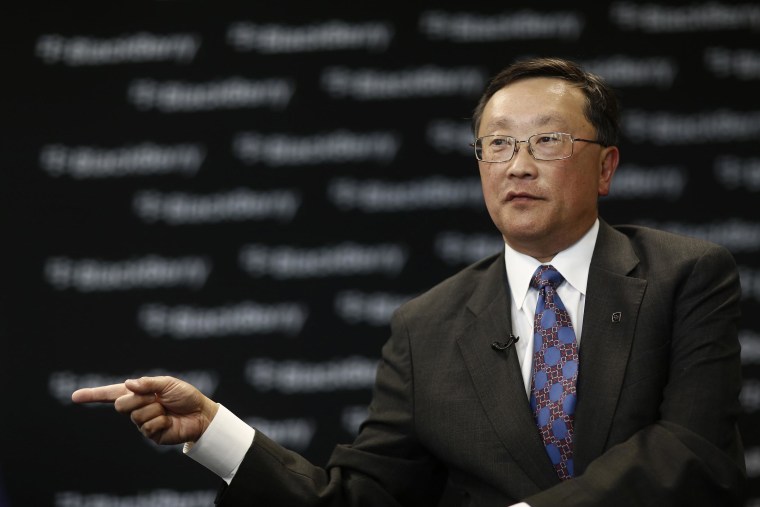BlackBerry's newly unveiled flagship phone may give some a sense of déjà vu with its hard buttons, trackpad and QWERTY keyboard.
But the new Q20 phone isn't the BlackBerry of old: It's all part of the path charted by newly minted CEO John Chen, who believes the key to BlackBerry's future lies in its past.
BlackBerry's announcements this week at the Mobile World Congress conference in Barcelona underscore Chen's renewed focus on BlackBerry's bread and butter: the physical keyboard that the company's small but faithful fan base adores, along with software and services that highlight the company's strength in security.
It's Chen's attempt to reverse BlackBerry's decline, in which the company's devices went from beloved "CrackBerry" to tech-world punchline in a few short years.
BlackBerry packed Tuesday's press release announcing the Q20 -- which features both a touchscreen and a physical keyboard -- chock-full of phrases devoted to "classic" BlackBerry features and their steadfast fans.
"Embodying feedback from its millions of passionate QWERTY customers around the world ..." the release began. It hailed the Q20's design as a way to "deliver its full and distinctive QWERTY experience," and hawked "the familiar and classic" hard Send/End function buttons as well as the trackpad.
Chen could not have stressed more that these features are aimed squarely at the BlackBerry faithful.
“In my first 90 days on the job, I consistently heard from our ardent BlackBerry customers that the hard buttons and trackpad are an essential part of the BlackBerry QWERTY experience..." Chen said in the Q20 press release. "I want these customers to know that we heard them.”
"I consistently heard from our ardent BlackBerry customers that the hard buttons and trackpad are an essential part of the BlackBerry QWERTY experience."
Lauding the BlackBerry loyalists is "an excellent step in the right direction," according to Steve Beck, managing partner at management consultancy cg42.
"The best advice that we could give to any CEO attempting this magnitude of turnaround is encapsulated in two words: don’t panic," Beck said. "Go back to your fundamentals. Focus on where you're strong. And make sure you solidify your loyal base. Chen is doing all of that."
It isn't Chen's first attempt at turnaround. He successfully reversed the fortunes for struggling corporate-software maker Sybase and sold the company to enterprise giant SAP in 2010.
BlackBerry is perhaps a more challenging turnaround target. By the time Chen took over as BlackBerry CEO late last year, the company had already found itself flat-footed in trying to compete with Apple, Google and Samsung for consumers' love -- which in turn meant top app developers largely abandoned the platform. Eventually, BlackBerry even began to lose its stronghold in the corporate market.
BlackBerry included those former corporate customers in its Mobile World Congress announcements, including new security features for its BlackBerry Messenger (BBM) service.
Just last week, Chen proved that he'll fight when facing a perceived affront to BlackBerry -- with an aggressive tone decidedly different from his mild-mannered predecessor.
But not all things BlackBerry are as they once were.
Unlike his predecessor Thorsten Heins, Chen has shown a willingness to explore options that include a future in which BlackBerry doesn't make devices. In December, Chen inked a deal with Foxconn, the world's largest market of electronic parts (and the Apple supplier that has made headlines over the past few years for labor violations in China), to develop and manufacture certain BlackBerry devices. Chen has even questioned whether BlackBerry needs to be in the device business at all.
He'd even consider selling off crown jewels like BlackBerry's BBM messaging service, at least if the price is right. Chen told CNBC this week that he "would definitely sell BBM" if someone offered BlackBerry $19 billion -- the price at which Facebook is planning to buy messaging app WhatsApp.
And just last week, Chen proved that he'll fight when facing a perceived affront to BlackBerry -- with an aggressive tone decidedly different from mild-mannered Heins.
The subject of Chen's ire was T-Mobile, which ran a promotion encouraging BlackBerry users to switch to iPhones. Chen said in a blog post that he was "outraged," at T-Mobile, slamming the carrier's move as "clearly inappropriate and ill-conceived."
Chen will need that fiery spirit if he wants to be the man who will turn BlackBerry around ... finally.
